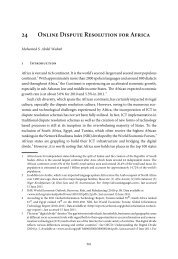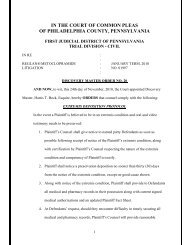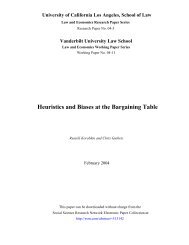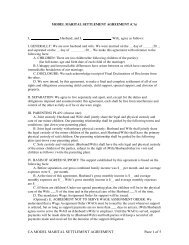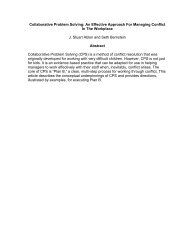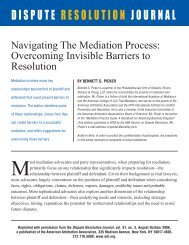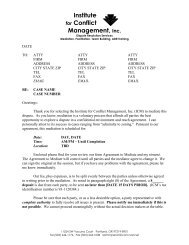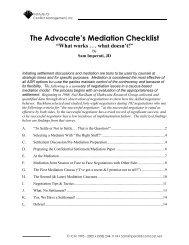17 e-Mediation - Mediate.com
17 e-Mediation - Mediate.com
17 e-Mediation - Mediate.com
You also want an ePaper? Increase the reach of your titles
YUMPU automatically turns print PDFs into web optimized ePapers that Google loves.
<strong>17</strong> e-<strong>Mediation</strong><br />
ADR criteria, all of these entities stressed the need for a new knowledge-base and skill-set<br />
regarding online interactions.<br />
Other questions regarding accreditation include who should be accrediting, and who<br />
should be accredited. Regarding the former, online mediation skills might be incorporated<br />
into the accrediting criteria for currently existing accrediting bodies, raising the bar for all<br />
mediators seeking accreditation. Alternatively, special bodies (private market or government<br />
entities) could accredit online mediators, confer status as an “ODR expert” as a specialty<br />
status within a general ADR accreditation or – zooming in even closer – testify that a<br />
particular mediator has studied one or more particular skills. Regarding the latter issue,<br />
the question of whether individuals should be accredited to practice, or agencies should<br />
be accredited to offer services, is an important question. 96 Most online mediation has so<br />
far been provided by agencies or service providers, with relatively few “private practitioners”<br />
in the field. This centralized model would make accreditation of service providers an<br />
important level of oversight. The question of whether individual mediators should undergo<br />
accreditation as well also deserves attention. Rule 97 noted how most of the early discussion<br />
regarding standards, regulation and accreditation focused on the organization rather than<br />
on individual practitioners. He explains how in ODR the organization is identifiable and<br />
find-able (through its website, address, management structure, etc.) whereas the individual<br />
filling the neutral role might be anywhere in the world, subject to different jurisdictions<br />
and legal obligations. Given the shifting trend I have noted in this chapter, regarding the<br />
rise of the individual-practitioner model, this might need to be revisited.<br />
4.3.2.3 Ethics<br />
The need for guidelines on ethics in ODR has been under discussion since an early stage<br />
in the field’s evolution. Many organizations and institutions, professional and governmental,<br />
have gotten in on the action by setting up <strong>com</strong>mittees and drafting papers, as Conley<br />
Tyler 98 notes:<br />
The American Bar Association established a task force to look at ways of<br />
ensuring that ODR services remain effective and ethical (Rule 2002:116). The<br />
Online Sector of the Association for Conflict Management prepared Proposed<br />
Guidelines for Online Dispute Resolution (Wiener 2001:4). In Australia,<br />
NADRAC 2002 provides draft practitioner standards for ODR and the<br />
Department of Justice Victoria has <strong>com</strong>missioned a study into accreditation<br />
of ODR practitioners.<br />
96 Id.<br />
97 Rule (2002).<br />
98 Conley Tyler & Bomstein (2006).<br />
395


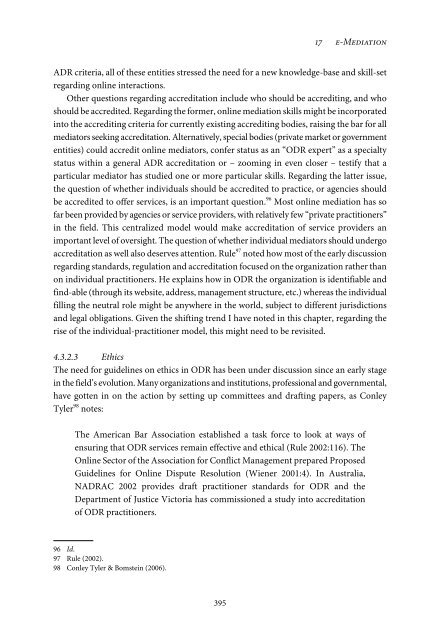
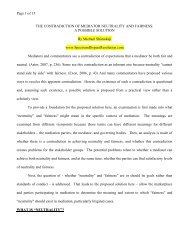
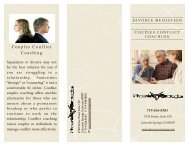
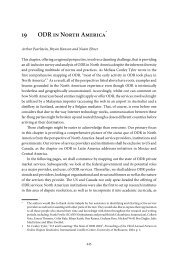
![Settlement Agreement Form [Agreement] - Mediate.com](https://img.yumpu.com/50682143/1/190x245/settlement-agreement-form-agreement-mediatecom.jpg?quality=85)

